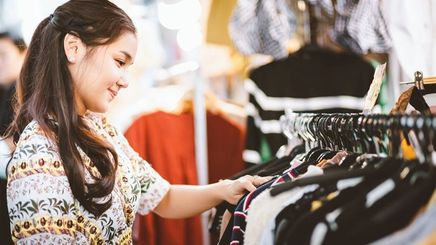
Is ukay-ukay shopping bad for your skin? If you’re not careful, wearing secondhand clothing can cause and other issues. Here are some ways to protect your skin so you can glam up – not to mention enjoy sustainable fashion – minus the flare-ups.
Don’t Try Before You Buy
The best thing about buying clothes from a physical store is you get to try them on. When shopping at an ukay-ukay, however, you might want to skip the fitting room. Resist the urge to try on that cute second-hand blazer to avoid irritating your skin – don’t forget these items are usually unwashed.
Instead, carry a measuring tape to make sure you don’t make any mistakes with size. Visualizing how a particular piece will go with the rest of your wardrobe will also force you to get creative. Do your skin a favor. Don’t try before you buy.
Disinfect Second-hand Clothes Properly
After a full day of ukay-ukay shopping, you come home excited to try on everything in your bag (reusable no less, because what better way is there to carry your goods from shopping sustainably?). But don’t forget to give your clothes a good washing before strutting your stuff.
One found that out of 800 secondhand clothes, 2.7% tested positive for parasites and ectoparasite contamination. Although this number is not significantly high, it’s always good to wash your clothes regardless of where you purchase them, but even more so if you’re buying used. Before you think about ditching thrifting altogether, double down on your disinfecting instead.
Washing your ukay-ukay finds with regular detergent is not enough to kill any potential pathogens. If your clothes are mostly white, go ahead and add ¾ cup of bleach to your dispenser and wash as usual. As a , add white vinegar to disinfect your clothes.
After washing, dry your clothes under direct sunlight if possible. The UV rays will disinfect your clothes from any leftover bacteria or parasites. Ironing your clothes twice is also a good idea. Run it on high for 30 minutes if you’re using a dryer. However, be careful not to use high heat for delicate fabrics like cashmere or wool. Check the care label for instructions or opt to hand wash and steam if the item doesn’t have one.
Your clothes aren’t the only things that should be germ-free. Give your skin all-day germ protection with LIFEBUOY Antibacterial Bodywash Total 10 formulated with Activ Silver+, a unique and powerful germ-fighting ingredient that deeply cleanses your skin from harmful bacteria, so you can wash your worries away no matter where you go or what you wear.
What Causes a Clothing Allergy?
Fabric dermatitis is a that occurs when certain fabrics touch your skin. Textiles made with synthetics such as polyester, rayon, nylon, spandex, or rubber aren’t as breathable as natural fibers such as cotton or linen, so you’re prone to sweating when wearing them, which might result in rashes. The rough textures of wool and tweed can also trigger flare-ups. The dyes, chemicals, and glues used on clothing, whether preloved or brand new, may cause an allergic reaction.
When choosing items, watch out for buttons, studs, and other baubles and bangles, especially those made from nickel. Before deciding on an item, inspect it thoroughly for zippers, buckles, and other tarnished or moldy hardware or .
Treatment and Remedies
Consult your dermatologist if you think you’ve developed a rash or allergic reaction from your clothes. Your doctor might prescribe you antihistamines or an over-the-counter cream. Avoid using too much fabric softener or skip it altogether if your skin is sensitive.
For your body, use a gentle product like Dove Sensitive Skin Body Wash. It’s formulated with moisture Renew Blend, which cleanses and renews moisture without irritating the skin.
Be extra selective about clothes you get from the UK (read: ukay). Choose breathable fabrics such as cotton and linen. Clothing labeled “wrinkle-free” or “dirt-repellant” are more likely to be chemically treated, so think twice about adding them to your cart for your skin’s sake. Of course, you’re probably going to want to pass on anything with a stain or holes (unless they’re distressed jeans that go with your ‘90s grunge style).
Finally, refrain from buying shoes, headgear, underwear, swimwear, or any other type of clothing that might harbor sweat or bodily fluids. If you’re expecting or shopping for your little one, you might be better off buying a crib or car seat from a regular store since newborns have lower immune systems and weaker defenses against allergens.
Everyone loves a good ukay-ukay find, but not at the expense of a skin allergy or a more serious condition. It’s all about shopping smartly and knowing how to (literally) shake the dust off your clothes. With these practical tips, you can protect your skin as you navigate the aisles of your favorite thrift stores and rock your next worry-free.